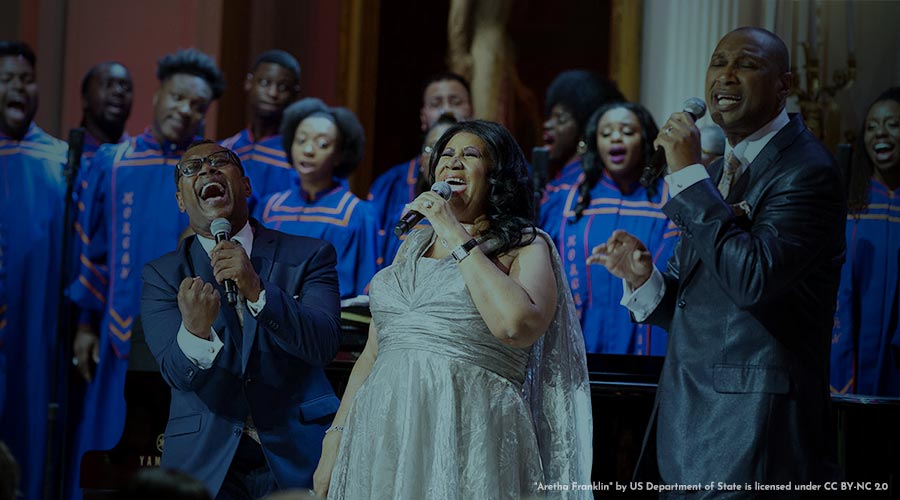This month marks the celebration of African American Music Appreciation Month, a date set by President Jimmy Carter on June 7, 1979, to raise awareness and foster appreciation of music that is composed, arranged or performed by African American artists. As President Barack Obama stated in his 2016 proclamation, African American music displays “the creative spirit at the heart of American identity,” and is among the world’s most innovative and powerful art.
African American music’s role in fostering discourse on civil rights, contributing to American art and stimulating creative thinking among citizens cannot be understated. For example:
- Legendary musician Jimi Hendrix catered to a largely white audience, but the roots of his music were in Black music. Throughout his career, Hendrix experienced racism from his industry and those around him.
- Soul icon Aretha Franklin, an 18-time Grammy Award winner, played a large role in advancing the civil rights movement. Similarly, Franklin was a voice of pride, hope and freedom to many in the African American community. Her rendition of the Otis Redding song “Respect” became an undeniable anthem of empowerment for African Americans and women.
- New York singer-songwriter Alicia Keys has been an outspoken advocate on issues like race and social justice. “It’s emotional for me as a Black woman, wanting to make sure that all the issues are addressed in America when it comes to race, when it comes to black people – wanting to make sure that message isn’t lost,” she said in 2016.
Robert F. Smith’s Support for African American Music
Today, a slate of organizations support the creation and advocacy of African American music, like the National Association for the Study and Performance of African American Music and Black Art Futures Fund. And in September 2020, the Recording Academy announced their first-ever Black Music Collective, with artists such as John Legend and Quincy Jones chairing the movement. The collective is intended as a “space for members to speak openly about new and emerging opportunities in Black music across all genres and identify ways to drive more representation,” according to the Academy.
Another group that supports African American music is the Sphinx Organization, which was formed in 1997 to address the underrepresentation of people of color in classical music. Through their competitions, funds and grants, the organization helps educate and promote young musicians of color. As a partner with Sphinx, philanthropist Robert F. Smith supports these efforts through the Robert Frederick Smith Prize and the Fund II Foundation’s donations, of which Smith is founding director and President.
Smith also led collaborations between Sphinx and Carnegie Hall, the nation’s most prestigious concert stage, as its first African American board chairman. “Carnegie Hall is perfectly placed to champion not only artistic excellence, but also access and exposure to the best music in the world,” he said in a 2016 statement. Since then, the organization created Celebrating Black History at Carnegie Hall, a virtual exhibit for Google Arts & Culture’s impressive collection of more than 4,000 items. The exhibit honors the history of African American artists, activists and leaders, highlighting the vital contributions of artists like Duke Ellington and Billie Holliday.
The Larger Role of Music in Everyday Life
This work to promote music education is increasingly valuable, as growing research shows links between creating and listening to music to creativity, productivity and the human stress response. The journal Applied Cognitive Psychology’s 2019 research proves that music enhances overall creativity, with certain types and tones more helpful than others. Additional findings from the National Library of Medicine link music listening and creation to stress-reducing effects, even bolstering the body’s stress response across several domains.
In educational settings, learning music has been shown to help young children’s ability to learn new words, aids memory and can improve hand and eye coordination. The National Association for Music Education (NAFME) notes that learning music can keep students engaged and active in school, fosters a sense of achievement and can even help students develop creative thinking that goes beyond the classroom and into problem-solving challenges found in forward-thinking careers.
By fostering music appreciation and education, we not only prepare children for a more creative school experience, we also help them find creative answers to future challenges.
Learn more about Carnegie Hall’s history of inclusivity and ways to honor African American Music Appreciation Month.






